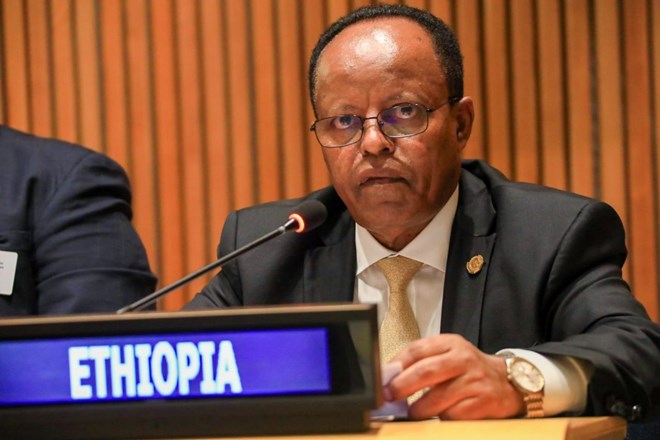
Martina Schwikowski
Thursday October 10, 2024

Ethiopia's new President, Taye Atske Selassie, has vowed to pursue peace in Ethiopia and beyond. The veteran diplomat replaced the first female president, Sahle-Work Zewde, who fell out with Prime Minister Abiy.
Ethiopia's former foreign minister Taye Atske Selassie, has taken up the largely ceremonial role of president after parliamentary approval.
In Ethiopia, the prime minister — currently Abiy Ahmed — holds much of the political power.
President Taye, 68, is an experienced diplomat who served at the United Nations and in Egypt. He is considered a close ally of Abiy Ahmed, who had appointed him foreign minister only in February.
Under Ethiopia's political structure, presidents are elected by the Federal Parliamentary Assembly for six years and can hold office for a maximum of two six-year terms. The president is considered the head of state.Diplomacy needed to quell violence
Given Taye's extensive experience in diplomacy and as a cabinet member, he might play a more significant role in initiating peace processes in the conflict-ridden Horn of Africa nation, experts say.
In his inaugural address as president, Taye outlined his key priorities would be building sustainable national peace and ensuring the rule of law.
"Protecting the constitutional system will improve the exercise of responsibility for protecting the peace and security of citizens. On the part of the government, all the doors of peace are still wide open," he added.
Ready for dialogue
In his speech, Taye also said the government in Ethiopia, which is plagued by internal security problems and civil wars, is ready for dialog.
"The government is always ready to talk to any side in a peaceful manner, be it individually or collectively," he said. But Taye also emphasized the government is determined to take legal action against individuals and groups who carry out activities that damage the solidarity and value of "our people, those who threaten public unity and social life and who turn people against each other through hate speech."
Taye spoke of a greater engagement, not only on the domestic front but also internationally: He vowed that Ethiopia will actively participate in peace and security efforts in the Horn of Africa, especially the conflict in Sudan. Ethiopia will also "work to strengthen relationships with neighboring countries in all sectors," he said.
Extensive diplomatic career
Taye was born in Debark, in the North Gondar Zone of the Amhara region. He obtained his first degree from Addis Ababa University in Political Science and International Relations and further post-graduate degrees from Addis Ababa University and Lancaster University in the United Kingdom.
Early in his career, Taye served as a consultant at the European department of the Ministry of Foreign Affairs, then the head of the Western Europe department. He was also the Acting Director of Information and became a consultant at the Ethiopian embassies in Stockholm and Washington.
Over his 40-year diplomatic career, Taye has served as ambassador to several countries and as Ethiopia's permanent envoy to the United Nations.
Outgoing, trailblazing female president
President Taye promised a better life for Ethiopians by announcing a government plan to increase economic growth by 8.4% this year. He aims to reduce poverty in Ethiopia and achieve more equality among its people.
Taye replaces 74-year-old Sahle-Work Zewde, who was Ethiopia's first female president. She stepped down after weeks of speculation on her tenure after reportedly falling out with Prime Minister Abiy Ahmed near the end of her term.
Sahle-Work Zewde had served as president since 2018, when Abiy Ahmed rose to power.
She has a significant diplomatic career and served in a number of diplomatic roles in Europe and Africa. Sahle-Work started her career in 1989 as ambassador to Senegal (1989-93), Djibouti (1993-2002) and France (2002-06), before becoming Permanent Representative of Ethiopia to UNESCO, the African Union (June-October 2018) and IGAD (Intergovernmental Authority on Development). Later, Ban Ki-moon made her the Head of the United Nations Office in Nairobi (UNON) in 2011.
Champion for women's rights
During her time as president, Sahle-Work backed campaigns and initiatives aimed at empowering women and girls, including the Generation Equality Forum.
Her appointment as president gave Ethiopian women a voice and set female standards for the future and was an important contribution to the normalization of women as change and decision-makers in public life.
Sahle-Work's appointment also helped enhance Abiy's political image with Western governments, along with his economic reforms, the selection of a gender-equal cabinet, and a peace deal with Eritrea that saw him awarded the Nobel Peace Prize.
But Abiy Ahmed's achievements were soon overshadowed by a brutal war against rebels in the Tigray region between 2020 and 2022. Ongoing conflicts against other ethnic groups have badly damaged his international standing, leading to sanctions being imposed by the United States.
Solomon Muchie Abebe contributed to this article
Edited by: Cai Nebe